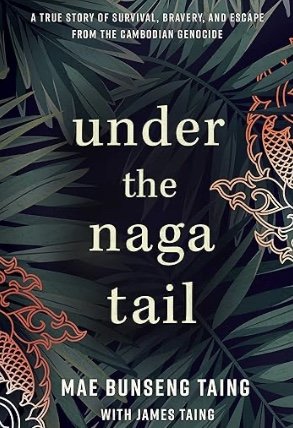Under the Naga Tail by Mae Bunseng Taing, with James Taing (Greenleaf Book Group Press)
Mae is eleven when Apollo 11 puts men on the moon, a feat that captures his imagination and makes him believe he’s living in a new era when anything is possible—even for a boy living in rural Cambodia. But as he nears the end of his adolescence, another era closes in upon him, his family, and his country, one that begins with Year Zero.
Cambodia has been in turmoil for several years, with “freedom fighters” battling the puppet government of the U.S.-backed Lon Nol. Popular opinion sides with the insurgents because they purportedly will restore King Sihanouk to his throne. Mae’s father is a firm believer in this theory, even when a woman emerges from the jungle, fleeing in terror for the nearby Thai border.
“Monsters…barbaric monsters…that’s what they are,” she tells Mae’s family as she recounts the atrocities committed by the rebel forces, “You must leave.” But Mae’s father is positive that “the freedom fighters were defending the honor of the king.” He had already fled one country, leaving China to find peace and prosperity in Cambodia, and he is certain it’s unnecessary to do this again. He and his eight children are staying put, even though it’s a short journey from their home to Thailand.
Within the first twenty pages of Under the Naga Tail, his decision becomes engulfed in horror that turns impossibly and dreadfully more intense with every passing chapter. Although the rebel forces prevail and are greeted with cheers and hope, they immediately close the border and kill three “Thai thieves” in a public execution that the entire community is forced to watch. Then they evacuate the area, claiming it’s a temporary measure to avoid American bombs. Mae and his family would never live in their former home again and many more wouldn’t survive to reclaim what once belonged to them.
The savagery that engulfs Cambodia between 1975 and 1979 is unmitigated by liberating troops from Vietnam who have no room for compassion. Across the border, where Mae and his family seek the safety of Thailand after barely surviving four years of starvation and forced labor, there’s no sanctuary waiting for them. According to C.I.A. reports, forty-two thousand Cambodians, Mae and his family among them, were removed from refugee camps by Thai troops and were taken to the sacred mountain of Preah Vihear. From there they were forced to climb down the other side of the mountain, back into Cambodia. Ten thousand of them were never seen again.
Scant mercy is given to the Cambodians who are displaced and subjected in the years between 1975 and 1979—not offered by the liberators nor by the country that could shelter them. The atrocities of the Pol Pot Time and the cruelties of its aftermath are revealed in excruciating detail, disclosed as Mae and his family live them. His account is appalling and soul-wrenching and guaranteed to disturb your dreams.
The miracle of his survival, with almost all of his family, only occurred because of strength and courage that goes beyond all human limits. If this book is painfully difficult to read, only imagine the agony that came as a son wrote the words his father used as he recalled and resurrected a hell on earth for the world to see and remember. Under the Naga Tail shows the bare bones of history that are all too often veiled in statistics and sanitized by bureaucratic reports. It turns readers into witnesses who just might help to change present-day crimes against humanity.~Janet Brown
